The Big Read: Gunfire on Paris streets sends a jolt halfway around the world
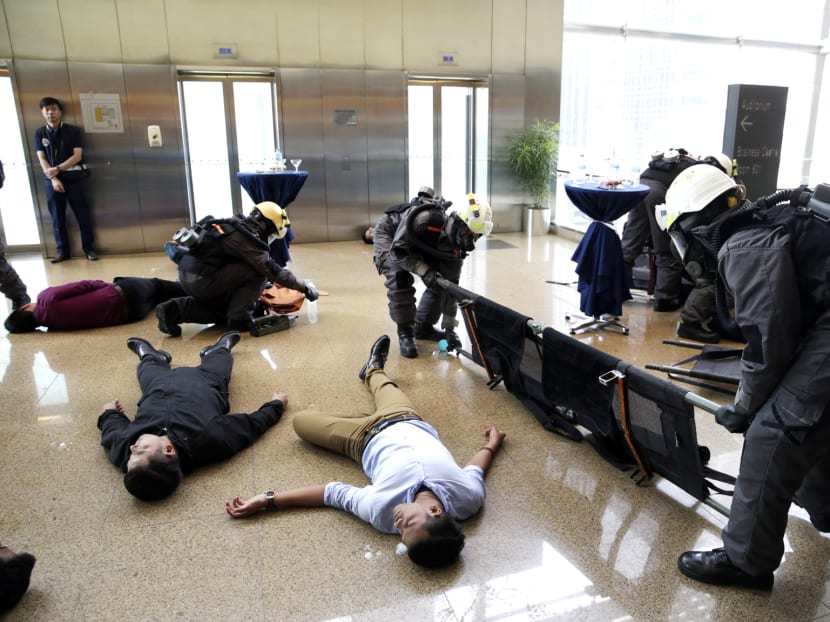
Singapore has held regular anti-terror exercises over the years. A drill on Wednesday involved a simulated chemical-agent attack at One Marina Boulevard. Photo: Wee Teck Hian
SINGAPORE — The spectre of terrorism — while never far away in this region — has reared its head again, after the Paris attacks that left scores dead and injured.
As counter-terrorism forces in Europe and elsewhere continue to hunt down those responsible for the carnage, the reverberations are being felt thousands of kilometres away, including in Singapore where people are being jolted out of their comfort zone to confront uneasy questions: Will Singapore become a target eventually? How will Singaporeans, who have long enjoyed peace and security, and the society at large cope with a terrorist attack? Can our much-vaunted social cohesion withstand the impact? Or will distrust seep in and destroy what has been painstakingly built up?
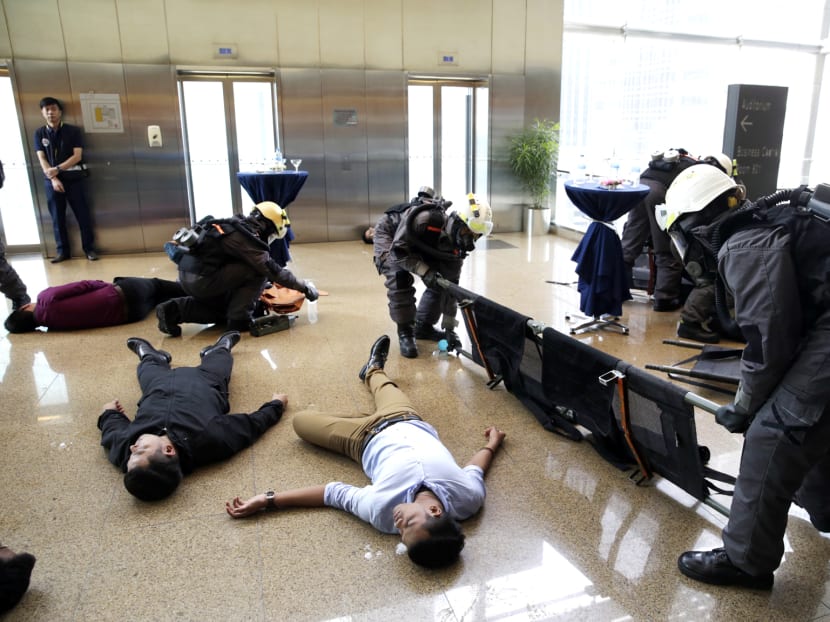
Each time an incident happens, Singapore’s leaders have been quick to stress that it is not a matter of if, but when, the country — which is in a region where terrorists are active — will be hit.
Earlier this week, Prime Minister Lee Hsien Loong warned Singaporeans that the attacks in Paris could happen here and they have to be psychologically prepared for it. In the wake of the incident, Singapore has raised its alert level and stepped up security measures and border checks, with Law and Home Affairs Minister K Shanmugam stressing that the incident showed that no country is immune, even when there is a state of heightened security.
With the Paris attacks fresh in their minds, some Singaporeans are bracing for a terrorist attack on our shores.
A street poll of 100 Singaporeans aged 18 and above, conducted by TODAY over the past week, found that almost four in 10 respondents think a terrorist attack will happen in Singapore within the next five years. A third said they do not think so, while the remainder were unsure.
The top concern among the respondents should such an incident occur here is personal and family safety, which was cited by 68 of them. This was followed by social tensions (16) and economic impact (11).
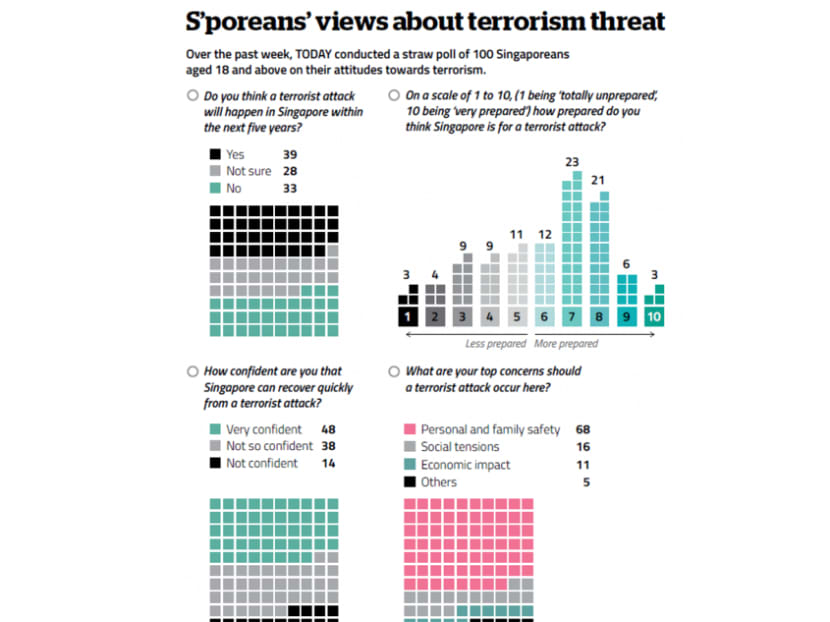
Nevertheless, a majority of the respondents were confident that Singapore, as a country, is prepared for an attack. On a scale of 1 to 10, more than three quarters of the respondents rated Singapore’s preparedness at 5 or higher. Preparedness aside, opinions were divided on whether the country could recover quickly from an attack. Almost half (48) said they were “very confident”, while 38 indicated that they were “not so confident” and 14 said they were “not confident”.
Commenting on the responses, Mr Joseph Franco, associate research fellow at the S. Rajaratnam School of International Studies (RSIS), noted that the Paris attacks have raised fears among some Singaporeans of the possibility of an attack at home but the sentiments may not last. “When such a visible event actually occurs... people (become) afraid. If they were (polled) six months before or six months after, I think the numbers would actually be different,” said Mr Franco, who specialises in radicalisation studies, counterterrorism, and counterinsurgency.
Among those who felt an attack was imminent was accounts manager Karen Chen, who is in her 40s. “After all, it happened in a place like Paris … Given that we are so cosmopolitan, with so many different races and cultures here, it’s highly possible,” she said.
The respondents also pointed out the fact that Singapore was situated in a volatile region, which makes it susceptible. Some 700 South-east Asians, including a few Singaporeans, have reportedly travelled to the Middle East to fight with or receive training by the Islamic State (ISIS).
“Because of the nature of our geopolitical area, and our proximity to Malaysia and Indonesia, we’ve always been subject to these kinds of threats,” said teacher Syafiq Rafid, 26.
Trader Nand Ramchandani, 60, felt that Singapore could be a target as the militants deem the country to be aligned with Western nations.
Researcher Tan Pei En, 23, added that the Republic would be a trophy target for the terrorists. She said: “Singapore is one of the safest places in the region, so if (the terrorists) wanted to send a message, they would attack (us) ... And there’s a lack of information on how capable, how extensive they are … Maybe it could happen tomorrow.”
However, some felt that Singapore might not be targeted because it is not a global actor. Student Jaslyn Au, 19 said: “Singapore is just a small country. ISIS is attacking all the larger countries that will make headlines when attacked ... there’s no benefit for them to attack Singapore.”
Mr Carl Wee, a 37-year-old hotel design director, felt that Singapore has remained “politically diplomatic”. While it contributes to international counterterrorism and humanitarian efforts, it is not an active participant compared to other countries that have conducted air strikes, for example, he said. Student Diana Rahim, 23, cited Singapore’s robust use of “mass surveillance and big-data analysis” which she felt were enough to pre-empt and thwart possible attacks.
Speaking to the Singapore media on Monday, Defence Minister Ng Eng Hen said the Republic’s security agencies never let their guard down, but he noted that terrorists “need only to break through your defence just once to wreak extreme havoc as they have done in Paris. There is no foolproof defence against someone whose mission is take down as many lives and (is) willing to lose his life in that process.”
In recent decades, the closest brush with a terrorist attack that Singapore has had — based on information made public — was in 2001 when the authorities thwarted plans by Jemaah Islamiyah (JI), a regional Islamic militant group, to bomb several targets here including the United States and Israeli embassies, and the Australian and British High Commissions. There were also plans to attack Yishun MRT station and US naval vessels in Singapore. Dozens of JI members were arrested as part of the Internal Security Department’s (ISD) operations.
Over the years, Singapore has been holding regular anti-terrorism exercises. Most recently, the Singapore Police Force conducted Exercise Heartbeat on Wednesday in the Central Business District (CBD). The exercise involved, for example, a simulated chemical-agent attack at One Marina Boulevard. The second part of the exercise will take place on Monday, with a simulated suicide bomber and gunman attack at Sentosa Golf Club and Sentosa Cove Village.
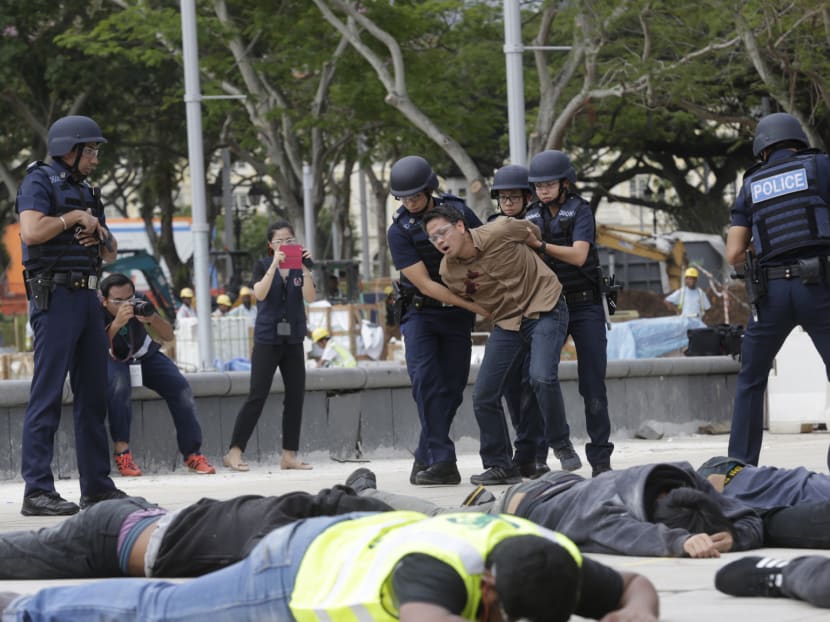
The majority of the respondents for the TODAY straw poll expressed confidence in the work of the armed forces as well as homeland security agencies in not only safeguarding the country from potential attacks, but also in responding to such incidents when they occur. Student Nur Hazwani Suryani, 20, said: “Our defence system is one of the most advanced in the world... We are a small nation, but we have the best weapons and soldiers.”
Mr Dinie Sudiyono, 26, who works in marketing, recalled how almost a decade ago, his junior college classmate had received a warning letter from the ISD after he had visited radical websites while working on an art project about anti-terrorism. “If (the authorities) were so alert back then, I think they would be even more aware of the smallest (going-ons) now... They can catch any whiff of what’s happening,” he said.
But some were less assured, pointing out that the security forces have had limited experience in dealing with real-life situations. While it was good to hold regular exercises to make sure the various agencies know what to do, realism is often lacking, they said. Singaporeans have also not experienced any attacks before and chaos could reign in the aftermath of such incidents, they added.
Marketing executive Nigel Pereira, 27, noted how police officers were initially overwhelmed during the 2013 Little India riots. “What more a terrorist attack?” he questioned. Admin manager Doris Wee, 59, who was in the CBD area when Wednesday’s drill was taking place, said, “If something really happens, Singaporeans aren’t mentally prepared … It’ll be very chaotic and everyone (will) panic.” Added consultant Joshua Teo, 30, “You can prepare as much as you want, but Singaporeans are too sheltered and have too much faith in the Government.”
In the event of a terrorist attack here, student Dennis Soh, 26, was among many respondents who cited the safety of their loved ones as a top concern. “Human beings naturally want their family members to be safe, and other than that, everything else is secondary,” he said.
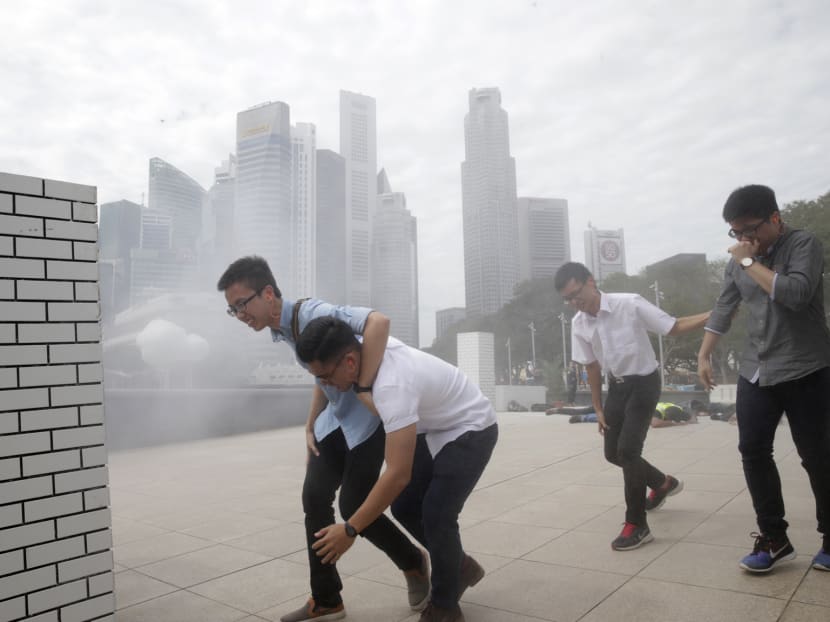
There were some who were concerned about the possible fallout on the economy, and how investors’ confidence would be shaken. Said student Seow Siew Hwee, 23: “We need to make sure our key infrastructure stays intact, our main shipping lines continue to function, and our communications infrastructure isn’t jeopardised.”
Some respondents felt that Singapore’s small size would make it easier for authorities to keep the situation under control and coordinate recovery efforts. Singaporeans’ drive and pragmatism would also get the country up and running again in no time, said graduate student Eleina Ailmchandani, 30. “Singaporeans are very focused on their livelihoods and the economy. If we could go from poverty to riches in just one generation, I don’t think we’ll allow our efforts to (go down the drain) ... We’ll pick up the pieces, and keep going,” she said.
Manager Cedric Tan, 35, was also confident that Singaporeans would band together in times of crisis. “Despite being a complaining and critical bunch, Singaporeans are generally patriotic and civic minded,” he said.
Nevertheless, there were some concerns among the respondents about how the social dynamics could change after the dust settles.
Ms Ailmchandani said her “biggest fear” was that the Muslim community could be marginalised, while student Diana Rahim, 23, said she was concerned that the attack might be “wielded as an excuse to further restrict civil liberties”.
Dr Alan Chong, associate professor at RSIS, said in the event of an attack, the Government has a key role in steering the country back on track while Dr Norman Vasu, deputy head of the Centre of Excellence for National Security (CENS), noted that responsible dissemination of information is crucial to ensure that the country recovers quickly.
Dr Vasu said: “In an information vacuum when an incident happens, it’s important for agencies to say what they know and what they don’t, rather than (allow the) vacuum (to be filled with) unreliable, uncertain information.”
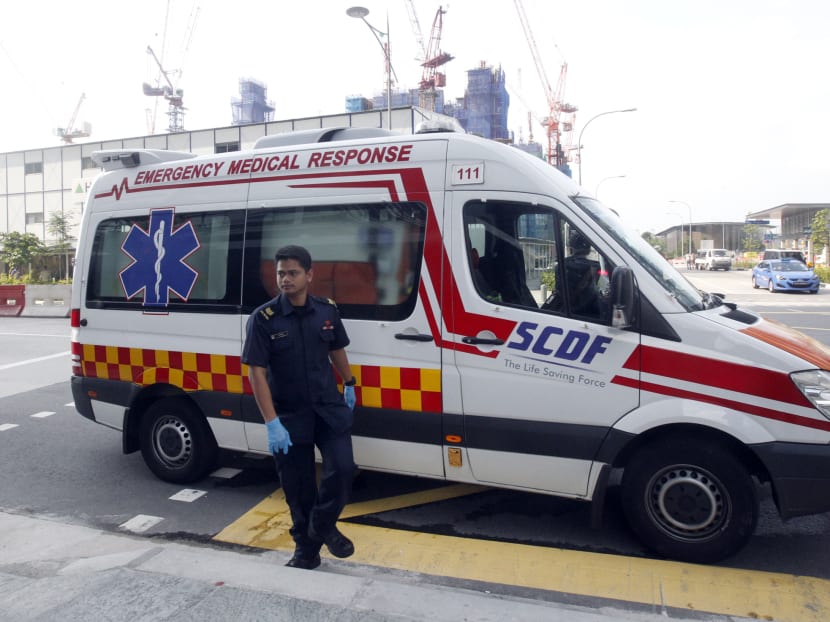
To build up Singapore’s social resilience to a terrorist attack, Dr Rohan Gunaratna, head of the International Centre for Political Violence and Terrorism Research, said more should be done to invest in online platforms to counter terrorism and promote friendship between different communities. He warned that terrorists are already “sprinting” in the online sphere, while governments worldwide are still “crawling” behind.
Ms Nur Diyanah Anwar, research analyst at CENS, said community leaders should continue to play their part in promoting multi-culturalism here. She cited the efforts by the Inter-Racial and Religious Confidence Circles, REACH and OnePeople.SG in helping to strengthen Singapore’s social fabric.
But beyond such government-directed efforts, there needs to be more “organic growth” at building communal trust, and such efforts should “come from Singaporeans themselves – bottom up”, she said. For that to happen, “everyone should understand that terrorism is motivated by individuals, who may use religion or other ideological affiliations for their purposes”, she said. “Singaporeans should view themselves as one people with a common responsibility to ensure the security of the country.”
The experts stressed that a tightly-knit community is crucial to enable the country to withstand the fallout of a terrorist attack. Mr Franco said: “You can kick all the doors down, or conduct raids, but that just addresses the symptoms… People are prompted to violence due to deep-seated grievances...The only way to address that is to enhance trust among citizens and prevent poisonous discourse.”
On their part, individuals should increase their awareness and understanding of terrorism-related issues. Otherwise, distrust would reign and misinformation will spread when attacks occur. “It’s the duty of citizens to be aware of the broader debate of extremism, in the wake of any attack,” Mr Franco said.
Ultimately, how a country responds to a terrorist attack comes down to how individuals react. Said Dr Vasu: “Terrorism, at its heart, is an attempt to cower societies into altering their way of life … People should (continue to) go out, keep interacting in restaurants, concerts, pubs, cafes and take public transport … (That’s) the best thing individuals and a community should do – to act in defiance of such a move would be to carry on (with life).”






